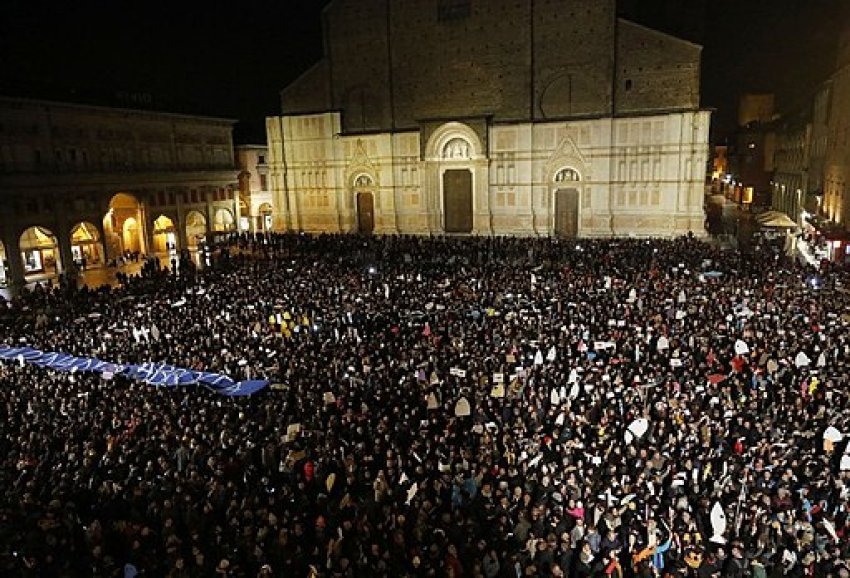
The past few months in Italian politics have been intense: The rise of Las Sardinas (the Sardines movement), the crisis in the Five Star Movement (M5S) and the regional elections held on January 26 all indicate the political balance could be changing.
Matteo Salvini’s far-right Lega (League) lost the election in Emilia-Romagna (a key region in northern Italy) and national polls now indicate a slightly lower approval rating for the party.
Both the centre-left — led by the Democratic Party (PD) — and the populist M5S now see the possibility of defeating Salvini and his racist, conservative agenda.
But can the Italian centre-left and the Sardines stem the reactionary and right-wing populism of Salvini and his allies?
Sardines movement
The Sardines movement has become a reference point for people who oppose Salvini’s ideology. Born in Bologna (the regional capital of Emilia-Romagna) they undeniably deserve merit for having filled town squares in the name of solidarity and inclusion and played a crucial role in the League’s defeat in that region.
Even though they did not officially endorse any candidate on January 26, nearly all the movement’s adherents voted for PD candidate Stefano Bonaccini, who won more than 51% of the vote.
Nevertheless, beyond opposition to Salvini’s policies, the Sardines’ political platform leaves much to be desired. A political movement aimed at challenging and overcoming the hegemony of the right needs a far more radical agenda.
For instance, a truly progressive, left-wing movement cannot leave aside workers’ rights, or the struggle against increasing inequality.
According to the latest Oxfam report, the wealth of the richest 1% of Italy’s population is more than that held by the poorest 70%. A significant proportion of Italian youth are now classed as working poor. All left-wing parties, movements and associations should fight to overcome this crisis with all their strength.
The Sardines’ values are based on Italian constitutional principles, such as anti-fascism, solidarity and equality, without distinction based on sex, race or religion. However, the Italian constitution also protects the right to work and against social and wealth inequality.
These principles need to be included in the Sardines’ movement against oppression, racism and right-wing populism — not just in the abstract, but by providing a concrete alternative to Salvini’s agenda.
In order to fight Salvini and his propaganda, it is not enough to oppose misinformation, fake news and hate speech. This has to go hand in hand with a struggle for better working conditions and against social and economic inequality.
Fighting Salvini and right-wing populism means fighting against the unfair and inequitable neoliberal system from which such ideology has developed — the one that produced the reactionary ideology of Salvini, France’s Marine Le Pen, Hungary’s Viktor Orban and other European far-right figures.
However, by convincing people that the moderate and pro-European centre-left is the only way to defeat right-wing racism and populism, the Sardines are indirectly legitimising the current political and economic system. Neoliberal Western capitalism cannot be the solution to the rise of right-wing populism.
What now?
The victory in Emilia-Romagna is good news, not only for the PD, but also for the whole coalition government, including the M5S. A League victory would have destabilised the government, legitimising the right’s demand for new elections.
By keeping themselves in government, both the PD and the M5S will be able to plan their future strategies.
The PD will now be able to claim a stronger voice within the government coalition following its victory and in light of the M5S’s significant drop in approval.
The M5S, however, is facing an unprecedented crisis: They fell from 33% of the vote in the 2018 general elections to 15% in the latest poll. Foreign Minister Luigi Di Maio resigned as M5S leader in an attempt to reverse this trend.
Neither the PD nor the M5S can effectively oppose and provide a concrete alternative to Salvini and the right and are using the “lesser evil” argument to present themselves as the best (and only) alternative.
These “lesser evil” parties are responsible for some of the worst neoliberal policies perpetrated in Italy and in Europe. The reason Salvini became so popular is because he presented himself as the only alternative to both the centre-left and the EU establishment, adding fuel to the fire of xenophobia.
The other major parties (including the M5S) are unwilling to challenge Salvini’s lies because as neoliberal pro-capitalist parties, they have no intention to change the system.
Both Salvini and his neoliberal political opponents are necessary to the survival of 21st century Italian capitalism, and are unwilling to take effective action on poverty and inequality.
For this reason, a large, organised, grassroots movement is needed — capable of going beyond the Sardines’ ephemeral opposition to populism — to undermine the foundations of the system.